United Nations Resident Coordinator and Humanitarian Coordinator in Syria, Imran Riza, Luay Shabaneh, UNFPA Arab states Regional Director and Muhannad Hadi, Regional Humanitarian Coordinator for the Syria Crisis
25 November 2021 – Today marks the beginning of the 16 days of Activism against Gender-Based Violence campaign. Globally, violence against women and girls remains a widespread and appalling affront to human rights. In Syria, women and girls, who already shoulder the burden of more than 10 years of conflict, are sounding the alarm over the toll that gender-based violence (GBV) takes on their daily lives, and telling us, loud and clear, that they demand change.
In times of emergency, women and girls are especially at risk, and often suffer sustained and - in many cases – dramatic escalations of violence. In Syria, the compounding impacts of the long-running crisis, COVID-19 related lockdowns and economic deterioration has resulted in increased reports of physical, psychological, and sexual violence committed against women and girls, including intimate partner violence and family violence.
Adolescent girls also continue to be specifically vulnerable and exposed to many of the most sever forms of GBV including sexual harassment, early and forced marriage, denial of education. In addition, adolescent girls, alongside women, are also increasingly subject to online harassment and exploitation, including on social media platforms. In the words of an adolescent girl from Deir-Ez-Zor: “We are exposed to all kinds of violence such as psychological, physical, sexual, verbal and emotional, in addition to deprivation of financial resources, right to education, work, inheritance and travel.”
Urgent and flexible funding dedicated to preventing GBV and to respond to survivors’ needs must be prioritized. In the first half of 2021, limited funding led to GBV services only being available in 7 per cent of communities in Syria, despite its recognition as the “shadow pandemic”. While there have been tangible efforts made by the humanitarian community – including, for example, the resumption of women and girls’ safe spaces following lockdowns, reaching more women and girls through remote programming and introducing door-to-door deliveries of aid and gender-segregated queues in camps – more must be done to support survivors and reduce the risk of gender based violence before it occurs.
Today, we reiterate our call for expanded support for GBV services, including psychosocial support,health programmes, safe spaces and other specialized services, including case management. This must go hand in hand with measures that address structural gender inequality in which violence can take root, including prioritizing women and girls’ economic and resilience needs, including livelihood opportunities, vocational training and cash assistance, and education for girls. We further reiterate the need to work towards eliminating harmful gender norms, including collectively engaging to stop all forms of violence against women and girls and to put an end to perpetrators’ impunity.
Finally, during the following 16 days, and every day beyond, we unequivocally condemn all violence against women and girls in Syria, including violence committed against women humanitarian workers. We further reiterate that survivors must be listened to and believed. The eradication of GBV is a collective responsibility, and we call on everyone to respond to the alarm raised by women and girls and take firm action to end the violence.
For further information, please contact:
Samir Aldarabi, Regional Communication Advisor UNFPA, United Nations Population Fund, Arab States Regional Office aldarabi@unfpa.org
Torsten Lajoie Flyng, Strategic Communications Officer, OCHA Regional Office for the Syria Crisis, torsten.flyng@un.org


